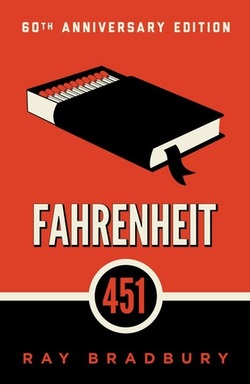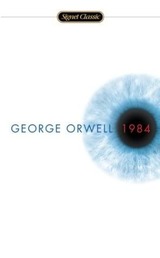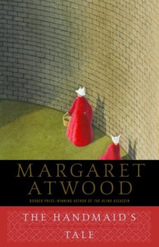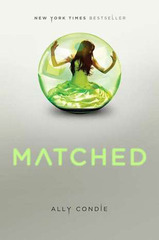
The story takes place in a not-too-distantly futuristic society where entire rooms are converted into television screens, people are even more passively ambivalent to issues than they are today, and, oh yeah, the job of the “firemen” is now to start the fires, rather than stop them. Books are illegal, you see—all books—so if you’re suspected of having any of them stashed away… well, you’re going to get a visit from the firemen.
Our protagonist, Montag, is one such fireman who develops an affinity for the books he burns, and the story basically follows his struggles to make a difference in this world where no one really cares anymore.
Well, this book was certainly a disappointment. I don't know, maybe my expectations were too high going into it? But there are some pretty serious flaws with this “cornerstone of dystopian literature”:
(WARNING: BELOW THIS LINE LIE SPOILERS AND ANGER-CAPS.)
[*I don't count Montag's wife, Mildred, as a character, because she's just a cardboard stand-in mouthpiece for the dystopian society; if she'd had any traits of her own, I might consider differently, but right now she is NOTHING.]
2) The whole explanation for why this society burns books is just... flawed. Not in a people-are-stupid-sheep-and-would-do-this way, but in a wait-that's-a-plot-hole way. I mean, Beatty says repeatedly that the problem with books is that they present too many conflicting viewpoints and that reading them generates confusion and argument—yes, okay, I see that—and that society is more peaceful and harmonious without them. This second part is HUGELY FALSE. I mean, ignoring the fact that this country is at war (and thus NOT peaceful), people are all the time killing each other and themselves! Reckless driving is considered an acceptable pastime! I mean, if part of your worldbuilding is "people here murder for fun," the explanation of your premise CANNOT BE "society burns books because they cause strife." Reducing strife is OBVIOUSLY not a priority for this society! Argh!
3) Beatty, in arguing for book-burning, is CONSTANTLY QUOTING BOOKS (and then, more often than not, accusing Montag of throwing quotes around willy-nilly, which is just... not the case). While I get trying to portray him as a hypocrite, the end effect is complete confusion! I mean, he must not only have read a shit-ton of books (illegally), but STUDIED THEM EXTENSIVELY TO MEMORIZE ALL THE RELEVANT LINES (um, extra-illegally?). And sure, there MIGHT be an explanation for this, and I get that it's functioning as a literary device, but it's never EXPLAINED—and at no point does Montag even try to turn the argument around and ask how Beatty can quote so much Shakespeare. It just. Makes no sense.
4) Considering (as mentioned above) the everyday attitude toward violence throughout the book (murdering is LITERALLY that thing "all the kids are doing"), Montag's shock at killing Beatty near the end seems massively unrealistic. Actually, it seems more likely he'd've started to plan Beatty's death the moment he was suspected of book-hoarding—or, at the very least, he'd consider the option. WORLDBUILDING AFFECTS CHARACTER MOTIVATIONS, MISTER BRADBURY.
5) Montag himself is utterly flat as a protagonist. He seems to have no control over his own actions—stealing books is something his hands do of their own volition, reading poetry to his wife's friends is against his (and EVERYONE'S) judgment, and basically he just behaves really stupidly throughout the book. I mean, this isn't so much a flaw in the writing as a personal pet peeve—I have a distinct inability to like stupid characters—but gosh, he was SO DAMN IDIOTIC.
(END SPOILERS AND ANGER-CAPS)
So. Yes. This book has plot holes you could drive a spaceship through. Also, the characters weren't very developed. But the language was pretty good? And I like the pro-literacy message? So, two stars, I guess.
Recommendations:

1984, by George Orwell
I am all the time confusing this book with
Brave New World (I think because I read them
around the same time); I can only keep track of which is which because this is the one I liked. Anyway, its worldbuilding is quite similar to that
in 451, except it makes a lot more sense. Plus, it
was written just a few years before 451, so it's a safe assumption that Bradbury read it while writing.

The Handmaid's Tale,
by Margaret Atwood
This is by far the most frightening dystopia
I've ever read -- mostly because it seems so
possible (in ways 451 just doesn't). A must-read
for anyone with any interest in the genre, in politics, or in women's rights.

Matched, by Ally Condie
This... is not a very good book. Fairly
run-of-the-mill 2010 YA dystopia with romantic subplot -- on-trend. However, it does have many of
the same themes (anti-literacy society, rebelling against a tyrannical state, etc.), plus a female protagonist (always a pro) and something resembling an emotional arc (I'm not sure
Bradbury was familiar with the concept).
Worthy of the quick read.

 RSS Feed
RSS Feed





